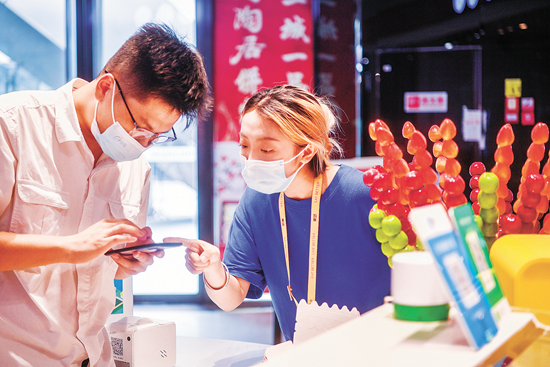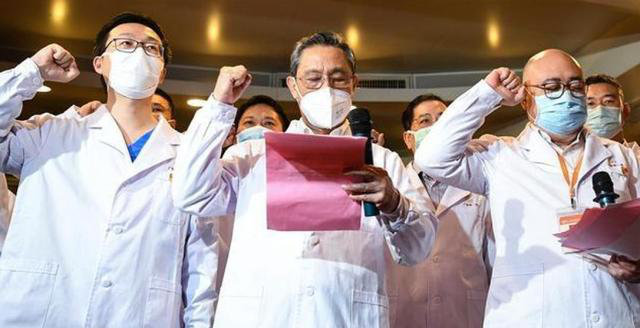"Takeaway operators" let merchants understand consumers better

Xing Ziyan (right), a "takeaway operator" who shuttles through Guangzhou Zhujiang New Town every day. Photo by interviewee
Putting on a ponytail, wearing T-shirt jeans, sunscreen ice sleeves, and riding a small electric donkey has become the daily standard of Xing Ziyan’s work. Xing Ziyan, 23, is a "food delivery operator". Her daily work is to shuttle through the Pearl River New Town in Guangzhou CBD to help merchants launch food delivery and promote operations.
Before graduating from Guangzhou University and joining a food delivery platform two years ago, Xing Ziyan had hardly visited Zhujiang New Town, let alone knew that it was home to the largest number of high-end catering merchants in Guangzhou. From being rejected by catering bosses at first, to being able to analyze takeaway data and help merchants improve their business conditions, Xing Ziyan enjoys this sense of being needed. She said that she has changed from a "foodie" to a professional "foodie".
In recent years, our country’s digital economy has continued to develop, and more and more catering merchants have begun to contact and use digital tools, and have launched takeaway services one after another. According to public data, the size of the takeaway market has exceeded 650 billion yuan. Taking Meituan takeaway as an example, as early as 2020, the number of orders completed in a single day has exceeded 40 million yuan. According to previous data from the Guangdong Catering Industry Association, the COVID-19 epidemic has accelerated the process of digitalization of quality restaurants to a certain extent. At present, more than half of five-star hotels and more than 80% of time-honored brands in Guangzhou have launched takeout. The takeaway market is trending well, and more and more catering merchants have followed the trend and touched the Internet, which has also promoted the development process of catering digitalization. At the same time, the demand for takeaway professionals has also risen, and "takeaway operators" have come into being. This once mysterious profession has gradually been recognized and understood by the public.
"Actually, it’s quite difficult," Ms. Xing said, adding that many of her friends misunderstood her job and thought it should be easy for her to go shopping, eat, drink and have fun every day. But Ms. Xing, who manages nearly 200 restaurants in Zhujiang New Town, has a lot of work every day. She analyzed that every business district is different, and the customer base for lunch and dinner is also different. There is a lot of knowledge in it, and all of them "run" by themselves.
In the beginning, Xing Ziyan often ate "closed doors". Due to the lack of solid professional knowledge and no personal connections, many bosses were reluctant to chat with her. "The biggest difference between Zhujiang New Town and other places is that it is difficult to meet the boss in the restaurant." Xing Ziyan said that for a period of time, she was guarding the door almost every day, just to "squat the boss". "The catering bosses in CBD are not ordinary people, and they need to use their strong professional operation knowledge to convince them that takeout is helpful to them."
After adjusting her mindset, Xing Ziyan focused her work on the old merchants who had already settled in. Through visits, operation and promotion, she established a certain customer base relationship with the bosses. After accumulating a certain reputation in the industry, the old merchants gradually began to introduce new merchants to Xing Ziyan.
Signing a merchant is only the first step in going online for takeaway, and the bigger problem is the follow-up operation. Xing Ziyan said that as a takeaway operator, you need to pay close attention to the restaurant’s takeaway production. Whether the quality of the ingredients of the merchant passes the customs, whether the packaging is strict or not, and how the service attitude is, even if a detail is not up to standard, it will directly affect the merchant’s order. When encountering merchants who do not have a high order conversion rate, they need to re-build the takeaway menu, and even from offline store decoration to promotion, they must help the merchant optimize and give feedback.
During the COVID-19 epidemic, a merchant in Zhujiang New Town launched takeout. At that time, the dishes sold were relatively expensive, and the customer base of takeout was basically regular customers. After Xing Ziyan learned about the situation, she suggested that the merchant take out the signature dish "stir-fried yellow beef" as a single set meal. The staple food is accompanied by rice and vegetables to keep the cost down. The monthly sales of takeout by the merchant suddenly soared from nearly 300 orders to about 1,200 orders.
In a western restaurant in the office building, the person in charge of the restaurant opened the data of the online store and asked Xing Ziyan for advice: "During this period of time, we opened a new event on the platform, and I feel that the effect is not very good. Is there something wrong with the setting?" After careful study, Xing Ziyan gave a suggestion, "You can try to match different packages and activities at different times; the order volume every Monday is the lowest, and then it rises all the way, indicating that after the weekend, everyone’s consumption mentality has a recovery process…"
A merchant said bluntly, "There are too many takeout doors, and there is no way to start without guidance. Thanks to a’takeaway operator ‘like Xing Ziyan." Seeing that the merchant made money, Xing Ziyan was also very proud, "I think every store here is actually related to me, and they will become better because of my existence."
"Takeaway operation is a very deep knowledge, and it has been advancing with the times." Xing Ziyan believes that doing this requires constantly observing the market, whether there are new categories emerging, and which set of operation methods is the most effective. "This is a process of continuous learning and iteration, and after summing up experience, tell the merchant which method is the most effective."
In the past two years, Xing Ziyan has helped many mid-to-high-end restaurants that had never thought of serving takeout before to serve takeout, and has also helped many restaurants that have never touched takeout to "start from scratch" and achieve an average of over 1,000 orders per month. She is familiar with every corner of Zhujiang New Town, and can accurately tell the launch time of each restaurant, and even the predecessors of these stores.
Sometimes, Xing Ziyan felt that it was hard, especially in winter or summer. However, she quickly convinced herself with the attractiveness of her career that she could freely "go shopping" outside during working hours, buy a cup of milk tea on the road, and chat with different people. This was probably her greatest harvest and happiness.
There are more channels for people to understand the catering industry. They will use various platforms to actively find some stores that they have not been to, read other people’s comments, and then try it themselves. Xing Ziyan said that the jobs on these platforms are all new opportunities.
Nowadays, ordering "takeout" has become an increasingly dependent way of life, not only in the catering industry, but also in reality, buying vegetables, daily necessities, and even maternal and infant products, as long as you can think of them, there is no delivery. In takeout data, merchants can always capture subtle changes in consumer preferences to improve their business strategies in a timely manner.
These days, Xing Ziyan cannot go out to work due to a broken toe, but her phone and mobile phone messages have hardly stopped. She said that this state is the same 365 days a year, and the pressure is much greater than that of e-commerce operations. "The goods of e-commerce are delivered every few days, and the takeaway is delivered immediately, which means that all kinds of problems encountered by merchants are immediate and need to be solved quickly."
The emergence of the new profession of "takeaway operator" indicates that the takeaway operation is gradually becoming more professional, which also releases more job opportunities to the local life service field. According to the recruitment platform, in first-tier cities such as Beijing, Shanghai, Guangzhou and Shenzhen, the demand for "takeaway operation" related positions is large, and most positions have a monthly salary of more than 10,000 yuan. In addition to traditional catering practitioners, many fresh graduates, retired military personnel, migrant workers, and people with disabilities have chosen to engage in the new profession of "takeaway operator". According to the "Big Data Report on the Development of China’s Takeaway Industry in 2020", from 2015 to 2019, the market size of China’s catering takeaway industry showed a rapid upward trend, with an average annual compound growth rate of 45.46%. Industry experts believe that the development trend of the takeaway industry has formed a talent siphon effect.
In order to enable the new profession of "takeaway operator" to serve the majority of catering merchants more systematically, in May 2020, Meituan Training and Meituan New Catering Research Institute jointly launched the "takeaway operation talent training program" with the Education and Training Center of the Ministry of Human Resources and Social Security. The training provides courses on five core competencies: business understanding, product research & development, platform operation, user operation, and data analytics. Students who successfully pass the course assessment will receive a certificate jointly issued by the Education and Training Center of the Ministry of Human Resources and Social Security and Meituan. This is also the first takeaway operator program in the industry endorsed by government entities.
China Youth Daily · China Youth Network reporter, Lin Jie












